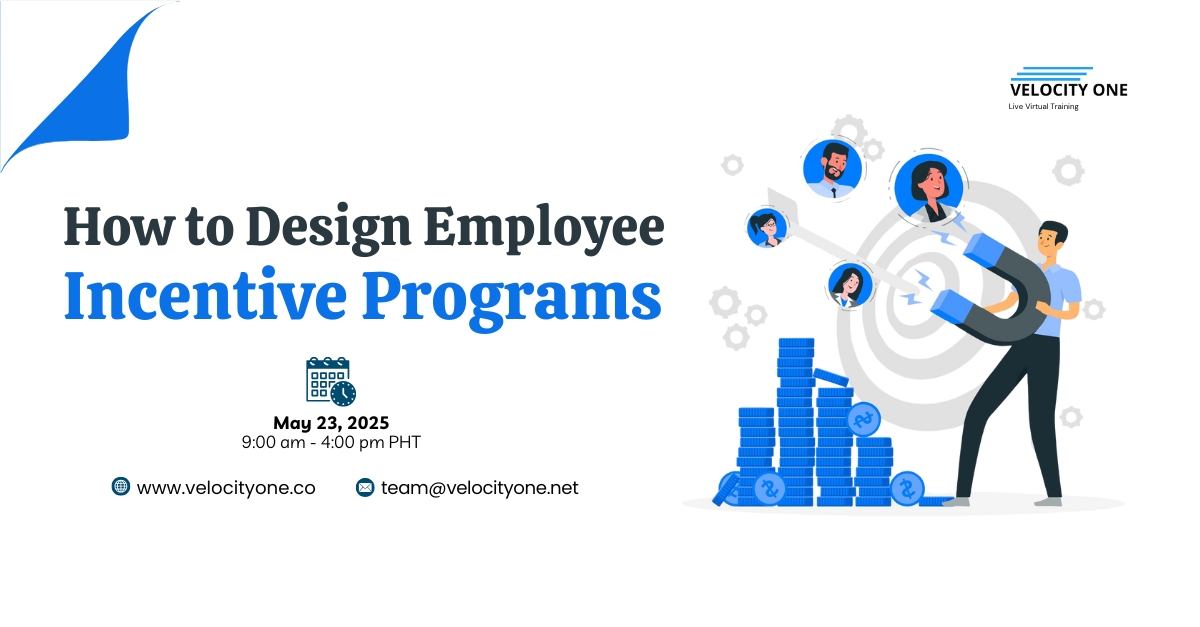TRAINING
Building Agility for the 21st Century Enterprise
HOW TO DESIGN EMPLOYEE INCENTIVE PROGRAMS





OVERVIEW:
A strategic, effective and competitive incentive program should be able to attract, retain and motivate employees for your business. These incentives must be aligned with, and support the company’s goals, sensitive to Filipino culture, and flexible to cater to diverse employee needs. Combining financial rewards with meaningful recognition and growth opportunities will help you foster a motivated and high-performing team.
The Philippines has its own unique business culture, influenced by values such as bayanihan, tulungan, pag-unawa, malasakit — roughly translated as “community sharing, teamwork, understanding, caring” as well as paggalang (respect), kapwa-tao, pakikisama (smooth interpersonal relations) and strong family ties including extended family (kumpare, kumare, ninong, ninang).
How would these Filipino cultural practices influence your design of incentive programs to support your business?
It is also known that pre- and post-millennial generations have significant variations in priorities and life-values and beliefs.
The training is provided virtually through the Zoom platform.
Participants who submit and pass the required hands on exercises shall be awarded a certificate.
LEARNING OBJECTIVES:
At the end of the training, you will:
- Identify and study Filipino cultural practices that are crucial to the design of effective incentive programs — individual and team based, mandatory monetary incentives, short and long term incentives, cafeteria-style of employee benefits.
- Learn the tools and insights on how to align incentives with business goals to drive the right behavior and performance, through company case studies.
- Tailor fit the type and structure of incentives to different employee levels and roles to ensure motivation across the organization.
- Create different levels of rewards to cater to various employee categories, from entry-level staff to top executives; pre- and post-millennials.
- Select appropriate technology tools to implement a digital platform, and evaluate current payroll software to track and manage incentives.
- Develop mechanisms to ensure fairness and transparency, as well as compliance with relevant income tax regulations and labor standards.
COURSE OUTLINE:
Module 1: Designing strategic and effective incentive programs sensitive to Filipino culture
Module 2: Types of incentives – short & long term, mandated and variable incentives, cafeteria-style incentives
Module 3: Tools and insights to align incentives with business goals to drive the right behavior & performance.
Module 4: Types and structure of incentives tailor-fit to different employee categories
Module 5: Digital platforms to implement strategic incentive programs – evaluation, selection and monitoring
Module 6: Fairness, transparency and compliance standards in incentive programs – case studies of recent Philippine Supreme Court decisions
SESSION REVIEWS:
 I learned actionable ways to make our incentive program better. -Ced N.
I learned actionable ways to make our incentive program better. -Ced N. Great and practical training. I got some ideas on how to make incentives that actually motivate our team. I’d recommend this training! -Belinda G..
Great and practical training. I got some ideas on how to make incentives that actually motivate our team. I’d recommend this training! -Belinda G.. I thought this webinar would be complicated, but it wasn’t. The tips were clear and I can use them right away. Thanks!. -Mary V.
I thought this webinar would be complicated, but it wasn’t. The tips were clear and I can use them right away. Thanks!. -Mary V. I got lots of good ideas for our employee rewards. -Leonor T.
I got lots of good ideas for our employee rewards. -Leonor T.LEARNING FACILITATOR:
Maragtas SV Amante, PhD.
Dr. Maragtas S.V. Amante is Professor at the University of the Philippines School of Labor & Industrial Relations (UP SOLAIR) in Diliman, Quezon City.
From 10 February 2011 to 09 February 2017, he was the Vice President for Administration of UP, with responsibilities over strategic HR management, performance management, compensation & benefits, labor relations, utilities management and procurement.
From 2008 to 2010, he was a professor at the College of Economics and Business, Hanyang University in Seoul/Ansan, South Korea. He was U.P. SOLAIR Dean from 1998 to 2001. He has more than 25 years experience in teaching, research and consultancy work in the areas of industrial relations, economics of human resources, and compensation.
Dr. Amante graduated with a Bachelor of Arts in Economics from the University of the Philippines’ School of Economics in 1983. After graduation from the U.P., he was recruited into the staff of the University of the Philippines’ School of Labor and Industrial Relations. He was granted an Asia Foundation fellowship to pursue a master’s degree in policy economics, which he finished in 1986, from the University of Illinois in Urbana Champaign in the United States.
His interest in Japanese human resource development led him to pursue doctoral studies in Japan, where he obtained his Ph.D. degree in 1993, from Keio University in Tokyo. In 2002-03, he was a research fellow at the Seafarers’ International Research Centre (SIRC) in Cardiff University, in Wales, UK. From 2002 to 2005, Dr Amante was a consultant and facilitator with the ASEAN Secretariat and the Japan Ministry of Health, Labor and Welfare. He was closely involved in a series of meetings and dialogues held in various ASEAN capitals, to develop a common regional framework of industrial relations in East Asia. He is a research correspond-ent with the Institute of Developing Economies (IDE), Tokyo and was a visiting scholar with Shanghai Open University in June 2018.
Current research interest: emerging patterns of work, performance and pay, and new forms of employment relations.
Learn with us!
